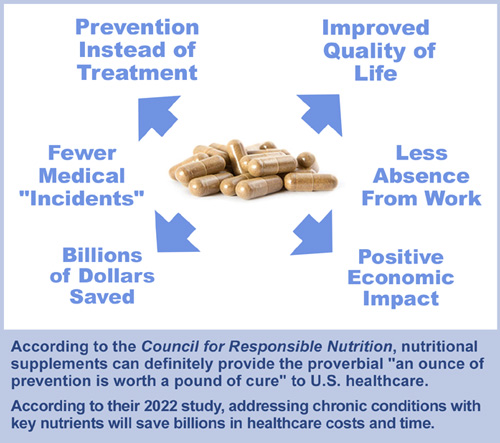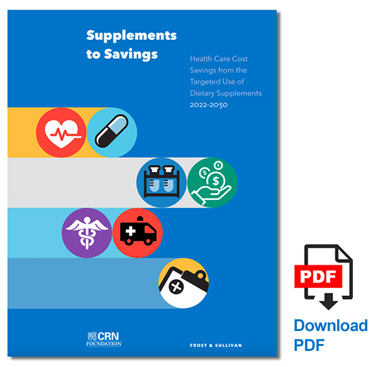A 2022 report produced by the Council for Responsible Nutrition (CRN) has detailed how tens of thousands of lives—and hundreds of billions of dollars—could be saved by simply expanding the use of the most-needed nutritional supplements.
According to the report, millions of medical incidents would be avoided, and millions of hours of lost labor would be saved, by targeting the common chronic conditions that plague the United States.
The savings would be realized over an eight-year period ending in 2030.
The chronic conditions identified by CRN include: Coronary artery disease, osteoporosis, age-related macular degeneration, cognitive decline, irritable bowel syndrome, and childhood development disorders.
It should be noted that the Council for Responsible Nutrition is a trade association for the nutritional supplement industry. Because of this the report is unlikely to be widely acknowledged by mainstream media; however, the report was created using government statistics on disease prevalence and established data on the nutrients that affect the different health conditions.
For example, world health organizations have known since the 1970s that Vitamin A supplementing was hugely beneficial to saving the lives of children. In 2011 researchers estimated that 600,000 lives would be saved with additional distribution of this single nutrient.
Another pivotal nutrient is Zinc. According to UNICEF, Zinc deficiency affects 1.2 billion people worldwide. The United Nations has labeled Zinc a “life-saving commodity” and says that increased access to the vital nutrient could prevent more than 200,000 deaths annually.
An ounce of prevention
According to the U.S. Centers for Disease Control and Prevention (CDC), more than 75% of America’s healthcare spending is for people with chronic conditions.
The U.S. invests less than 3% of total healthcare expenditures on preventive care services, so the report offered evidence that the use of certain nutritional supplements by specific populations could reduce the medical costs associated with these prevalent diseases. This would include both direct and indirect costs associated with the diseases.
Put another way, since supplementing is inexpensive compared to medical treatment, a little more expenditure up front can prevent substantial expenditures later—in direct medical costs, lost lives, and millions of lost hours of work.
The full title of the report is, “Supplements to Savings: U.S. Health Care Cost Savings from the Targeted Use of Dietary Supplements, 2022–2030.” The report was investigated and written by research firm Frost & Sullivan.
Here is a partial list of the chronic conditions the researchers examined, along with the relevant nutrients needed to treat the diseases nutritionally:
• Coronary Artery Disease (CAD)
The clinical literature indicates that the relative risk reduction of a CAD events with the use of Vitamin K2 was 15.7 percent. This means an estimated 274,933 CAD events could be avoided, resulting in $8.86 billion in savings. In addition, the CAD reduction for use of magnesium supplements is 5.34 percent. This means that magnesium supplementation could prevent 93,349 CAD events resulting in $3 billion in healthcare savings.
According to the authors of the study, the inclusion of other critical nutrients such as Omega-3 fatty acids and dietary fiber would result in additional savings. If an entire supplement regimen was undertaken by every at-risk CAD candidate, the total savings could be as high as $85 billion through the year 2030.
• Osteoporosis
For osteoporosis, the researchers projected that if high-risk populations took calcium and Vitamin D at preventive intake levels, 361,507 avoidable medical events would be prevented. After adjusting for the number of high-risk Americans already taking these supplements, the U.S. could realize a whopping $155.41 billion in new savings.
• Cognitive Decline
If the population at high risk of cognitive decline were to supplement with vitamins B6, B9, and B12 at preventive intake levels, 270,642 avoidable medical events would be prevented. This would result in a net savings of $97.64 billion in savings during the next seven years, after adjusting for the number already supplementing.
• Irritable Bowel Syndrome (IBS)
If high-risk populations for IBS were to take probiotics at preventive intake levels, over 397 million hours of missed work would be prevented, the authors said, or $110.22 billion in net savings. Adjusted for current supplement usage, the additional savings would equate to $94.83 billion.
According to the report, other conditions that would benefit greatly from supplementation included childhood cognitive development and macular degeneration.
Full details on the report, along with a downloadable PDF, can be found at the CRN Foundation website here.
– – –
Sources: Council for Responsible Nutrition Foundation, NPR.org, VisualCapitalist.com., CDC.gov-chronic conditions.



